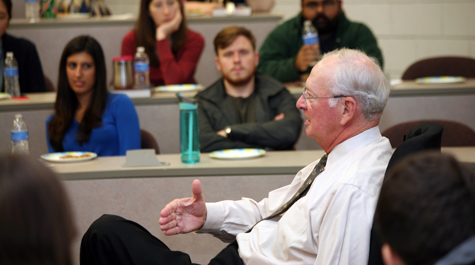Alumnus Bill Hoffmann Shares Why Pro Bono Work Matters
Multiple student organizations at William & Mary Law School recently hosted William E. Hoffmann, Jr. ’67, J.D. ’77, who visited campus for two days as both a Dunn Fellow and a Williamson Fellow.
Hoffmann had an extraordinary law school career, as he graduated first in his class and was editor-in-chief of the William & Mary Law Review. He followed his graduation from William & Mary with a successful career at King & Spalding, where he retired as the firm’s pro bono partner.
As a Dunn Fellow-in-Residence, Hoffmann gave a Dunn Civil Liberties Luncheon talk entitled “Protecting Civil Liberties through Pro Bono Service.” The talk was supported by the H. Stewart Dunn, Jr. Civil Liberties Project, which funds a variety of programs to enhance knowledge of civil liberties and encourage future generations of graduates to devote their time to advancing civil liberties causes.
Taking off his jacket and settling comfortably into his chair, Hoffmann regaled students with stories about a long and successful career characterized by pro bono work.
Hoffmann said his first pro bono project was a death penalty case, during which he got the defendant’s sentence reduced to life imprisonment.
Shortly thereafter, Hoffmann fought for the First Amendment rights of high school students to publish their school newspaper. The newspaper was reinstated, the school gave the students their editor positions back, and the case was recognized by organizations across the nation.
Throughout his career, Hoffmann has also worked with international cases. Hoffmann said he was “incredibly lucky” to be appointed to international tribunals. He was the special counsel for Sierra Leone, where he investigated such issues as witness tampering and perjury, and also worked for the International Criminal Tribunals for the former Yugoslavia and Rwanda.
Even in retirement, Hoffmann advocates for those involved in asylum cases. Most of his cases are based in Africa, with other cases from various areas in the Middle East and other regions.
Hoffmann stressed to students that pro bono work is important, no matter the size of the case.
“The small cases are important. It’s important to help someone keep their house, it’s important to keep a woman from being abused by her husband,” Hoffmann said. “Is that really any less important than getting someone a life sentence rather than a death sentence? Who can say?”
As Williamson Fellow, Hoffmann returned to the classroom, teaching several classes, including Professor Angela Banks' “Immigration & Citizenship,” Professor Nancy Combs' “International Criminal Law,” and Professor Christie Warren’s “Public International Law.” He also held a session with public policy students.
Supported by an endowment that honors the late Richard A. Williamson for his years of service as law professor and Counsel and Coordinator of Legal Affairs for the College, Williamson Fellows are people of extraordinary caliber drawn from law firms, the government, and the bench.
Hoffmann’s extraordinary caliber was on display last May when he was honored with the Law School’s Citizen-Lawyer Award during the 2014 Graduation Diploma Ceremony. Representing the Law School Association’s highest recognition, the award is given annually to a graduate or friend of the Law School who has made “a lifetime commitment to citizenship and leadership.”
“Bill Hoffmann is the consummate citizen lawyer,” said Associate Dean Robert Kaplan, who introduced him as Dunn Fellow. “Literally from his first few months of practice, continuing throughout his career and, now, during retirement, Bill has safeguarded civil liberties through pro bono service.”
About William & Mary Law School
Thomas Jefferson founded William & Mary Law School in 1779 to train leaders for the new nation. Now in its third century, America's oldest law school continues its historic mission of educating citizen lawyers who are prepared both to lead and to serve.



